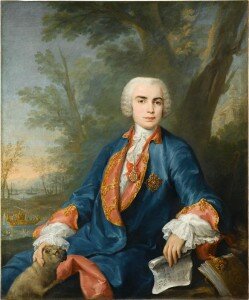
Jacopo Amigoni: Portrait of the Soprano Carlo Broschi,
known as Il Farinelli (1752)
King Philip V ruled Spain from 1 November 1700 until his son Ferdinand VI eventually succeeded him in 1746. Historians have not been kind to his legacy, suggesting that he only marginally advanced the government of his predecessors and that he was more of a liability to affairs of the state. That’s rather kindly putting it, as under his reign, Spain had to declare bankruptcy in 1739. Philip, it seems, was afflicted by fits of manic depression and increasingly fell victim to a deep melancholy. He would refuse to get properly dressed, did not shave and could not be bothered to conduct State business. Clearly, his second wife Elizabeth Farnese was thoroughly in charge. Numerous remedies and cures had been unsuccessfully tried, until doctor Giuseppe Cervi, believing in the efficacy of music therapy, suggested that music might have a soothing influence. On 25 August 1737, the court engaged the celebrated Italian castrato Farinelli who was duly named chamber musician to the king.

King Philip V

